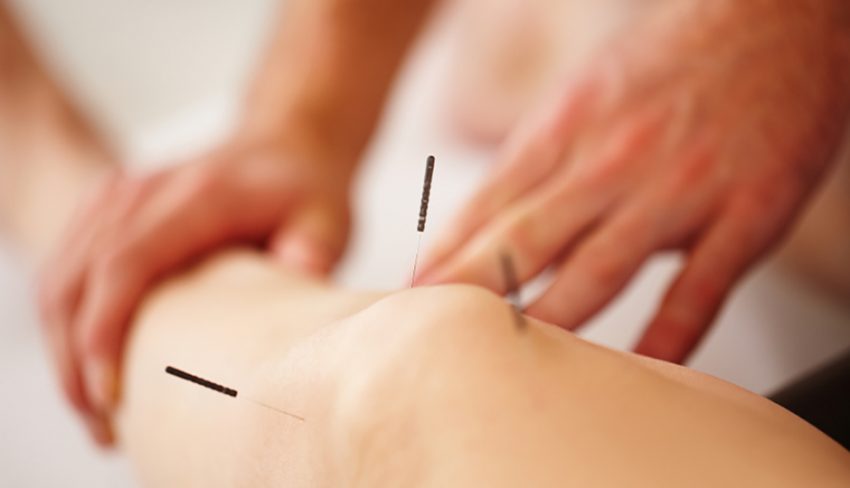Mass General Using an Ancient Therapy to Complement Modern Cancer Treatment

Photo Credit: Mass General Cancer Center
The Massachusetts General Hospital Cancer Center is known throughout the world for its innovative and often revolutionary cancer treatments. What may be surprising is that members of the Mass General team are supplementing their biomedical cancer treatments with a therapy so ancient that it predates recorded history. The therapy? Acupuncture.
Acupuncture’s premise is that energy (chi) flows through a person’s body over 12 channels and 365 specific points. When one’s chi is disrupted or blocked, problems (such as pain) ensue. By inserting thin needles into the affected points, a trained acupuncturist can restructure and rebalance the blocked chi. This ancient Chinese “medicine” has shown worthwhile effects on cancer patients.
“Unlike biomedicine, with acupuncture we can come up with special point prescriptions that we can customize,” says Jessica Gerber, LIC.AC., an acupuncturist who works with the hospital’s Katherine A. Gallagher Integrative Therapies Program. “The beauty of being able to customize the medicine is that you can really get to the root of what people want help with.” With cancer patients, that could mean a reduction in radiation site pain (especially for breast cancer patients), post-surgical pain and the nausea that often accompanies chemotherapy.
As doctors learn more about the efficacy of acupuncture, all the better for cancer patients. Gerber’s recent participation in a Mass General study and paper on acupuncture’s benefits for carpal tunnel syndrome patients has sparked interest in the Cancer Center. “[My patients] like knowing that there’s research going on around the acupuncture,” she continues. “It gives them something to grab onto.”
Gerber and the rest of the research team knew going in that the brain changes over time due to trauma, stress and other factors. “The very high takeaway from the carpal tunnel paper is that acupuncture can help re-map the brain in response to something that is not good for it,” she says. Using acupuncture to re-map the brain varies depending on the symptom it targets. “Headaches sometimes have immediate results, but chemo-induced peripheral neuropathy, constipation, diarrhea things we are trying to help regulate could take longer,” Gerber says.
“Just because the needles are taken out, it doesn’t mean the treatment stops working,” Gerber says. “It’s really integrative, and you work it into your other treatments.” Cancer is not a one-size-fits-all disease, and acupuncture is not a one-and-done therapy. Patients typically schedule acupuncture between other therapies and appointments and should plan to stay for at least 20 up to about 45 minutes. She recommends two acupuncture treatments a week for the best cumulative effect.
In addition to helping patients experience lessened symptoms, acupuncture also aims to eliminate the symptoms. For example, when a patient has acupuncture before beginning radiation or chemotherapy, it can help throughout the treatment. Gerber explained that she had a throat cancer patient, a runner, who began acupuncture before starting radiation. He could continue his daily runs six weeks into the eight-week therapy.
Since acupuncture is holistic medicine, one might wonder how much its effectiveness is due to expectations and a positive mental attitude. Gerber says expectation does play a small part in it. “One of my favorite parts of my job is when people who have never had acupuncture before come in and are skeptical,” she says. “They see what it can do and then sign up immediately for the next treatment.”
Acupuncture is just one of the many integrative therapies used in the Gallagher program to help support patients and their families cope with a cancer diagnosis, but it is one that is promising. Gerber says more work is needed to continue studying the mechanisms. The patient-practitioner relationship, the right expectations, types of treatment and length of treatment should all be looked at. “The challenge of acupuncture research is that it’s such an individualized medicine, and research by nature is so standardized.”
Cancer treatment produces a lot of anxiety, and Gerber thinks standardizing when acupuncture happens could make patients less anxious. “If we had data that said people who started with acupuncture prior to having their radiation treatment had better outcomes, that would be amazing,” she says. “So, we’re starting to brainstorm some of these ideas, and hopefully get some funding to make them happen.”
This is a paid partnership between Mass General Cancer Center and Boston Magazine


